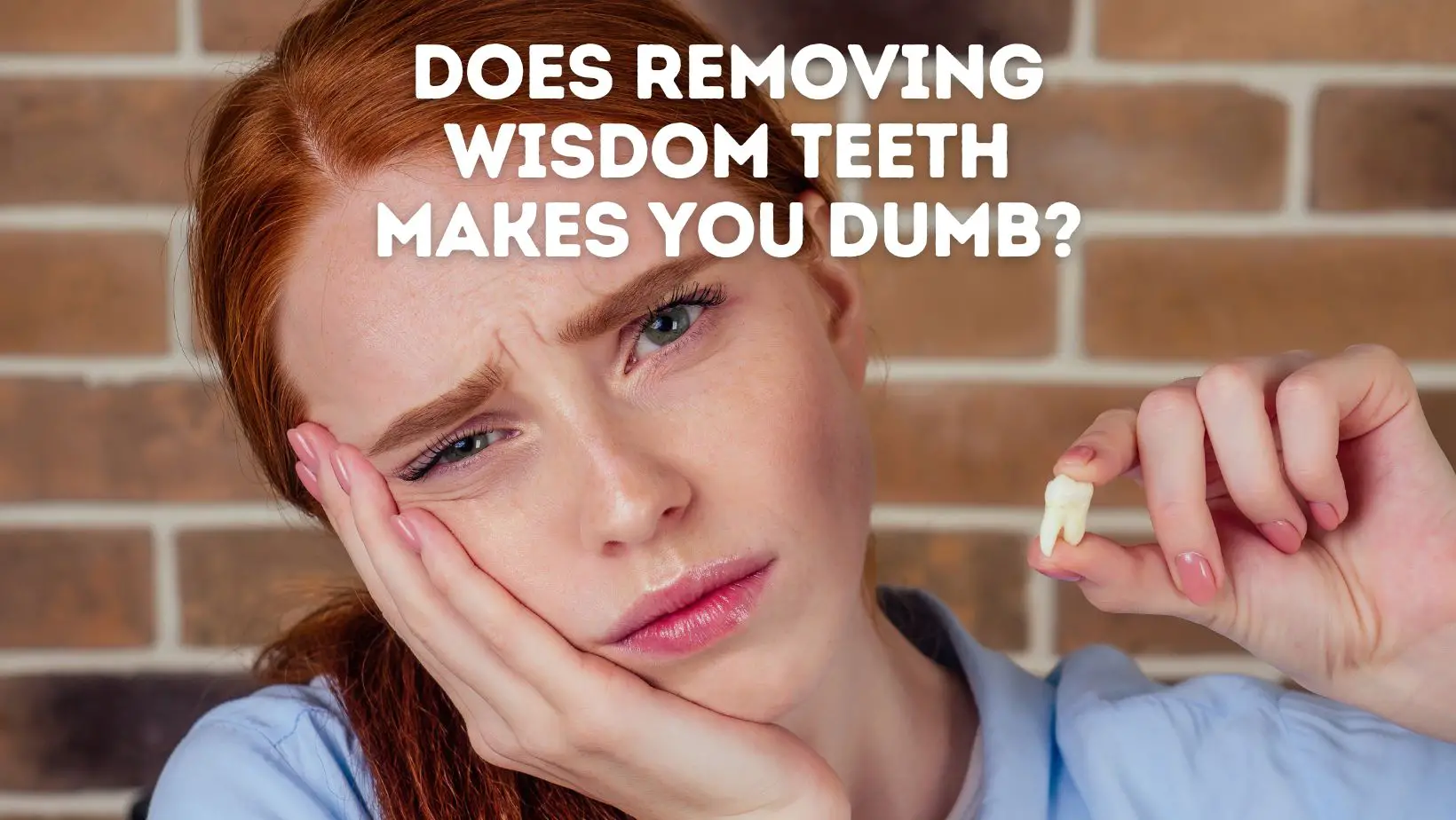
The belief that removing wisdom teeth makes you dumb is a myth. There is no scientific evidence or basis to support this claim. Wisdom teeth removal is a common dental procedure performed when these teeth are impacted, causing pain, infection, or other dental issues. It is a preventive measure to maintain oral health and prevent potential complications.
Intelligence and cognitive abilities are not affected by the removal of wisdom teeth. The notion that wisdom teeth removal can negatively impact intelligence or cognitive function is not supported by any credible scientific research. Intelligence is determined by various factors such as genetics, environment, education, and overall brain health, which are unrelated to the presence or absence of wisdom teeth.
It’s important to rely on accurate information from dental professionals and scientific research when considering any dental procedure. If you have concerns or questions about wisdom teeth removal, consult with a qualified dentist or oral surgeon who can provide you with appropriate guidance based on your specific dental condition.
Does wisdom teeth affects Memory and intelligence?
No, wisdom teeth removal does not directly affect memory. Memory is primarily governed by the brain, and the removal of wisdom teeth does not have a direct impact on cognitive function or memory retention.
No, wisdom teeth do not have any direct impact on intelligence. Intelligence is determined by various factors, including genetics, environment, education, and cognitive abilities. Wisdom teeth, which are the third set of molars that typically erupt in late teenage years or early adulthood, are unrelated to intellectual capacity.
Does wisdom tooth removal affect the brain?
Wisdom tooth removal does not directly affect the brain. The surgical procedure for removing wisdom teeth focuses on the oral cavity and jaw area, and it does not involve any manipulation or interference with the brain. The effects of wisdom tooth removal are localized to the extraction site and surrounding tissues, and they do not extend to the brain or its functioning.
Does wisdom teeth removal make you act funny?
The removal of wisdom teeth itself does not make a person act funny. However, the use of anesthesia and pain medications during the procedure can have temporary effects on cognition and behavior. Some individuals may experience drowsiness, confusion, or altered speech patterns immediately after the surgery due to the effects of the medications. These effects are generally short-lived and wear off as the medications metabolize.
Why do Some people act so weird After wisdom tooth is removed?
People may appear to act “weird” or exhibit unusual behavior after wisdom teeth removal due to the effects of anesthesia and pain medications. Anesthesia can cause temporary disorientation, confusion, or drowsiness, while pain medications can also induce drowsiness or alter speech patterns. These effects, combined with the residual discomfort or swelling from the surgery, can lead to individuals behaving differently than their usual selves. It is important to remember that these effects are temporary and will subside as the medications wear off and the person recovers from the procedure.

Will I say weird things after wisdom teeth removal?
It is possible to say or do things that may seem strange or unusual after wisdom teeth removal. This is mainly due to the effects of anesthesia and pain medications used during the procedure. These medications can cause temporary confusion, drowsiness, and altered speech. However, these effects are usually short-lived and should subside as the medications wear off.
Advantages and Disadvantages of Wisdom Tooth Removal
What are the benefits of keeping your wisdom teeth?
The decision to keep or remove wisdom teeth depends on several factors, including their position, health, and potential for complications. If the wisdom teeth are healthy, fully erupted, properly positioned, and can be easily cleaned, there may be some benefits to keeping them. These potential benefits include:
- Functionality: Wisdom teeth can contribute to the chewing process, especially if they align correctly with the rest of the teeth.
- No surgical risks: By not undergoing wisdom teeth removal surgery, one avoids the potential risks associated with the procedure, such as pain, swelling, infection, and nerve damage.
- Cost savings: Keeping the wisdom teeth may eliminate the need for a surgical procedure and the associated costs.
What is the disadvantage of removing wisdom teeth?
A: While wisdom teeth removal is a common procedure, it does have some potential disadvantages. These include:
- Pain and discomfort: The extraction site may be sore and tender for a few days after the surgery.
- Swelling and bruising: Swelling around the extraction site and mild bruising of the face are common side effects.
- Infection: There is a small risk of infection at the extraction site, which can cause pain and delay the healing process.
- Nerve damage: In rare cases, the nerves in the jaw can be damaged during the extraction, leading to numbness or tingling in the lower lip, tongue, or chin. This condition is usually temporary but can be permanent in rare instances.
- Sinus problems: Wisdom teeth located in the upper jaw can sometimes be close to the sinuses. Their removal may create a communication between the mouth and the sinus, resulting in sinus issues temporarily.
- Anesthesia risks: General anesthesia or sedation used during the procedure carries its own set of risks, although they are usually low.
Why do experts now say not to remove your wisdom teeth?
It is important to note that not all experts agree on whether or not wisdom teeth should be removed. The decision to remove wisdom teeth depends on several factors, including the individual’s oral health, the position of the teeth, and the presence of any symptoms or complications. Some experts argue that if the wisdom teeth are healthy, properly positioned, and can be easily cleaned, there may be no immediate need for their removal. However, regular monitoring and professional dental care are essential in such cases.
Why do models remove wisdom teeth?
Models, like many other individuals, may undergo wisdom teeth removal for various reasons. Some models may choose to have their wisdom teeth removed to prevent any potential future complications. Wisdom teeth can sometimes cause crowding or misalignment of the existing teeth, which can affect the model’s appearance. By removing the wisdom teeth, models aim to maintain the symmetry and alignment of their teeth, which is often important in their line of work.
Is it common to have all 4 wisdom teeth?
A: It is common for adults to have four wisdom teeth, although the number can vary. Some individuals may have fewer or even extra wisdom teeth. The number and development of wisdom teeth can be influenced by genetics and ethnic background. In some cases, one or more wisdom teeth may not fully erupt or remain impacted (stuck beneath the gum line), requiring removal.
Q: Does removing wisdom teeth change face shape?
The removal of wisdom teeth typically does not change the overall shape of the face. The shape of the face is determined by factors such as bone structure, muscle tone, and underlying facial features. Wisdom teeth extraction mainly affects the oral cavity and jaw area, and any changes in facial appearance after the procedure are minimal, if any.
What is the oldest age you can get wisdom teeth?
A: Wisdom teeth generally start to develop in the late teenage years, between the ages of 17 and 25. However, the eruption of wisdom teeth can vary from person to person. In some cases, wisdom teeth may erupt even later, well into a person’s 30s or 40s. It is important to note that the eruption of wisdom teeth can also be impacted or incomplete, requiring removal to prevent complications.
Does your jawline get sharper after wisdom teeth removal?
The removal of wisdom teeth does not directly affect the sharpness of the jawline. The jawline is primarily determined by the underlying bone structure and the muscles in the jaw area. While wisdom teeth removal may cause some temporary swelling or bruising in the jaw area, these effects are generally minor and should not significantly alter the overall shape of the jawline.
Do wisdom teeth improve the jawline?
Wisdom teeth do not directly improve the jawline. The appearance of the jawline is primarily determined by factors such as genetics, bone structure, and muscle tone. Wisdom teeth can sometimes cause crowding or misalignment of existing teeth, which may affect the overall alignment and aesthetics of the jawline. In such cases, removing the wisdom teeth can help maintain or improve the appearance of the jawline by addressing any alignment issues.
Does wisdom teeth removal affect singing voice?
Wisdom teeth removal does not directly affect the singing voice. However, as with any oral surgery, there may be some temporary effects on speech and vocal quality immediately following the procedure. The use of anesthesia and pain medications can cause temporary swelling, discomfort, or altered speech.
These effects should subside as the mouth heals, and the singing voice should return to normal once the recovery period is over. It is important to follow any post-operative instructions provided by the oral surgeon to ensure a smooth recovery and minimize any potential impact on vocal performance.

Hi, This is Lyn, I suffer from dental sensitivity for a very long time. PowerToothpaste.com is where I share my views of various toothpaste brands, along with tips on how to use toothpaste and what to look for when purchasing.
